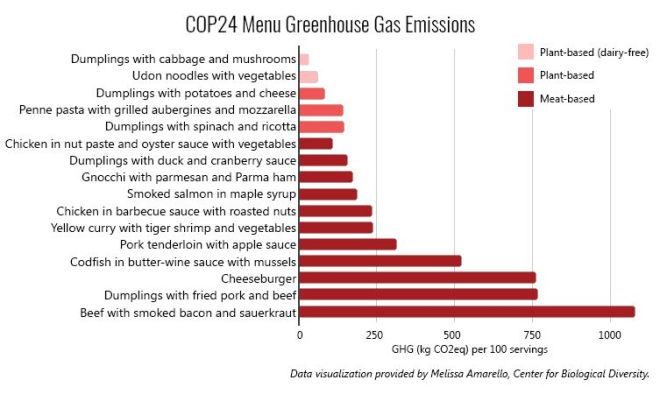Right at this moment delegates from all over the world are meeting in Katowice, Poland, for COP24, the United Nations’ Framework Convention on Climate Change conference, to discuss the implementation of plans to limit greenhouse gas emissions so that global heating is restricted to 1.5C.
Of course, this means that delegates need to be fed. You would think that the fare on offer would as eco-friendly as possible. Unfortunately this is not the case. A new study by the Center for Biological Diversity, Brighter Green, and Farm Forward, has discovered that the menu on offer could potentially be responsible for 4,000 metric tons of greenhouse gas emissions.
The report opens ‘While world leaders gather in Katowice, Poland, for the upcoming United Nations Framework Convention on Climate Change conference (UNFCCC), or COP24, the main food court serving the conference’s estimated 30,000 visitors is offering twice as many meat-based entrees as plant-based entrees. This means a menu with an unnecessarily high carbon foodprint. If international climate conferences hope to lead the way in addressing the climate crisis, organizers can’t afford to overlook the food offered at their events.’
The study stated that the meat-based options generated around 4.1kg CO2e per serving, while the plant-based options emitted around 4 times less than that, at 0.9kg CO2e per serving. If each of COP24’s 30,000 visitors chose a meat-based dish during the conference, this would contribute the equivalent of ‘burning more than 500,000 gallons of gasoline or the greenhouse gas emissions attributed to 3,000 people flying from New York to Katowice.’
To put the menu into specifics, the least carbon-intensive entrée is cabbage and mushroom dumplings, which in comparison to the most carbon-intensive entrée, beef with smoked bacon, produced 35 times less greenhouse gas emissions. Now it may seem of interest to offer a wide-range of foodstuffs to cater to everyone’s individual tastes and dietary requirements, but when a group of people gather to lead the charge against climate breakdown, shouldn’t their personal actions reflect their lofty ideals?

“The meat-laden menu at COP24 is an insult to the work of the conference,” said Stephanie Feldstein, director of the Population and Sustainability program at the Center for Biological Diversity. “If the world leaders gathering in Poland hope to address the climate crisis, they need to tackle overconsumption of meat and dairy, starting with what’s on their own plates. That means transitioning the food served at international climate conferences to more plant-based options with smaller carbon footprints.”
30% of anthropogenic greenhouse gas emissions are made up of emissions directly caused by the global food system, with a large amount of those emissions being caused by animal agriculture.
‘If current trends continue, food production will nearly exhaust the global carbon budget for all sectors by 2050.’
For us to effectively tackle climate breakdown, both the production and consumption of meat and dairy must be reduced significantly. If we want to keep global heating below 1.5C, a drastic shift in our diets needs to occur, especially with the high meat consumption in western countries, and the growing demand for meat in countries like China.
A report published in 2014 called ‘Dietary greenhouse gas emissions of meat-eaters, fish-eaters, vegetarians, and vegans in the UK‘, noted that the average emissions of meat eaters was 7.19kgCO2e/day compared to 2.89kgCO2e/day for those who consumed a vegan diet.
Unfortunately, even though the science of agricultural emissions is sound, the issue is not one that has been covered in international climate negotiations and debates. This lack of attention is shown by the short-sighted menu offered at COP24.
“We know that we cannot meet the Paris Agreement goals, or the 1.5C target, with business as usual,” said Caroline Wimberly of Brighter Green, who will be in Katowice for COP24. “Food is not a matter only of personal choice, but an essential factor in solving the climate crisis. Demand-side policies and efforts, including food waste reductions and shifting diets—prioritizing populations with the highest consumption of animal-based foods—are critical in achieving a climate compatible food system and curtailing emissions.”
